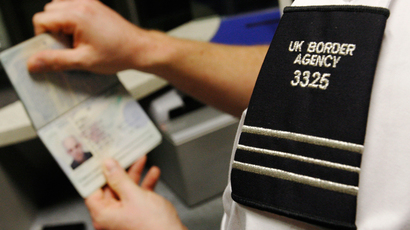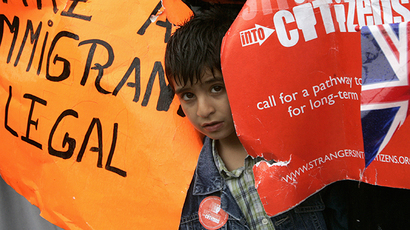English no longer first language for 1,700 UK schools – report

For an increasing number of British school kids English is no longer their first language, with children in 1,700 schools across the country speaking another tongue at home.
The UK’s Department for Education figures indicate that English
is no longer the first language for the majority of pupils at one
in nine schools across the country. The number of pupils with
English as their second-language has risen by 20 percent to
almost 1.1 million since 2009, reports The Daily Telegraph.
The newspaper claims that non-English speaking pupils come to
school at the age of five with no experience in using the
language. Most of the children speak one of 14 different
languages including Pahari, Urdu, Bengali, Punjabi, Somali,
Polish, Hindi, Gujarati, Tamil, Portuguese, Arabic, Spanish and
Pashto.
The schools have hired interpreters to help to cope with the
language barrier at parents’ evenings and enlisted bi-lingual
teaching assistants for reception classes.
The new figures show that schools where native English speakers
are in the minority are not entirely in London as previously
suggested, but rather are spread across the country. While 968 of
the 1,755 schools are in the capital, there are a total of 290
across the Midlands, 172 in the North West and 162 in Yorkshire
and the Humber.
The schools are attended by a total of 835,174 children. The
number of pupils speaking another language other than English as
their mother tongue has risen by 10 percent in the past five
years.
The highest proportion of children with English as a second
language is in Sacred Heart Primary in Sandwell in the West
Midlands, with almost 99 percent speaking another language first,
the official figures cited by the daily showed.

As part of annual census more than 15,288 primary and secondary schools provided the information about the first languages of the pupils to the Department for Education.
The report comes after growing concerns about the huge influx of
migrant workers in the country. David Cameron’s government lifted
restrictions on the rights of Bulgarians and Romanians to work in
the UK on January 1. A survey conducted in January by Daily Mail
showed that an overwhelming 77 percent of Britons fear that the
biggest strain will be on schools.
Douglas Carswell, a backbench Tory MP, urged for a "national
debate about the impact of social cohesion” in Britain
adding “I want to make sure that we create first and second
generation Britons,” the newspaper quoted him as saying.
According to official estimates, the number of pupils is to grow
by a million exceeding eight million by 2022, the highest levels
in more than 40 years, the Telegraph reported.
However, Vice president of the EU Commission has urged Briton to
stop the political rhetoric about an “invasion of
foreigners” as the politicians were putting the future of
the UK in jeopardy
"The fact and figures, and we all know this, show it is
simply not true and I do believe also that British industry has
made it very clear, putting the figures on the table and showing
that the GDP of Britain rose by 3-4 percent because of the input
of these working Europeans who come to Great Britain," said
Viviane Reding, during her webchat on European citizenship on
January 10.
She added that most of the things people in Great Britain are
told about the wave of migrants, who take jobs and leech off the
welfare system are “myths.”














